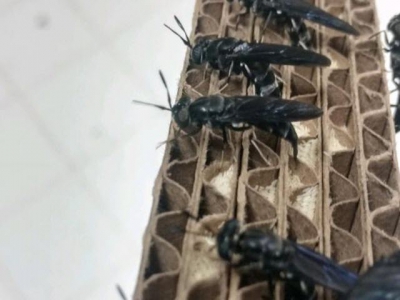Novel system optimizes insect farming for livestock feed

Technology harnesses black soldier fly larvae production for livestock feed ingredient and waste removal.
Black soldier flies typically lay one batch of eggs.
By reducing organic waste and serving as an animal feed source, black soldier fly maggots provide a zero-waste option for organic recycling, according to Dr. Jeff Tomberlin, professor in the department of entomology at Texas A&M University and director of EVO Conversion Systems LLC.
Now, Tomberlin and his team have developed a new method for rearing the larvae, Texas A&M AgriLife Research said in an announcement.
The larval form of the black soldier fly eats profusely during this stage of development, Tomberlin said, explaining that the larvae essentially climb on top of each other, wriggling and writhing in an effort to get to the food source or waste material. The larvae eat until they are full, and as they take a breather from their snack, other larvae push in to snag a bite to eat, shifting the others up and out of the way, creating a tower.
At the end of the 14-day cycle, the larvae tower is dried, which becomes livestock feed — most commonly as a protein source for chickens but also for other livestock and farm-raised fish. The product can also be used as compost for landscaping, the announcement said.
It’s been very successful in China, Europe and other parts of the world, and the process is now being utilized for profit in Texas.
The new method Tomberlin and his team developed — the "Black Soldier Fly Bullet" — is more efficient way to harness the process because the bullet provides storage of the larvae for an extended period of time, giving users the ability to “wake them up” whenever the need arises by opening the container and placing them on the waste material.
According to AgriLife Research licensing manager Robert Brummett, the technology "also facilitates storage and shipment of (black soldier fly larvae), thus creating more stability and assurances in processes utilizing" the larvae.
Texas A&M AgriLife Intellectual Property & Commercialization worked with Tomberlin to exclusively license this AgriLife technology created by Tomberlin to his company, EVO Conversion Systems LLC.
The company manages organic waste with black soldier fly larvae and uses the insect biomass as a sustainable animal feed ingredient and crop fertilizer -- an opportunity to create zero waste on a larger scale, Tomberlin said.
“We were able to develop a system to put them in a state of stasis,” said Dr. Jonathan Cammack, chief operating officer of EVO Conversion Systems and former AgriLife Research postdoctoral research associate. “We are taking newly hatched larvae and putting them in an optimal environment to develop to a certain point, then sit and hang out until ready to be used.”
Tomberlin explained that data support the concept that they can hold the larvae at an optimal temperature, potentially for up to five months.
“Most groups around the world are focused on that 14-day development that they can feed waste to it, recycle it and produce protein,” he said. “Through our research at Texas A&M, we have been able to enhance that system."
Cammack explained that they wanted to put some stability into the system, so the team looked at how much waste material a colony needed in order to flourish without having too much material for the colony or too little. This balance would help to maximize the number of eggs that the colony would produce.
“If they lay a whole bunch of eggs and you don’t have enough material for them to digest or process, then you are losing eggs, and if you don’t have enough eggs and you have a whole bunch of waste available, then you have waste that rots,” Cammack said. “One is driving the other.”
Source: Texas A&M AgriLife Research, which is solely responsible for the information provided and is wholly owned by the source. Informa Business Media and all its subsidiaries are not responsible for any of the content contained in this information asset.
Related news
 First PPP agricultural project launched in Hau Giang
First PPP agricultural project launched in Hau Giang The knowledge sharing and technical assistance project for agriculture was launched in the Mekong Delta province of Hau Giang on August 19 with the debut
 Vegetable, fruit exports target for 2019 reachable: experts
Vegetable, fruit exports target for 2019 reachable: experts With good results seen in the first seven months of this year, experts forecast that the revenue target of 4.2 billion USD in vegetable and fruit exports
 Timing makes a big difference in farming
Timing makes a big difference in farming While working for a large seed company, I once had a chat with one of the directors, a financial fundi who contributed to steering the company in the right